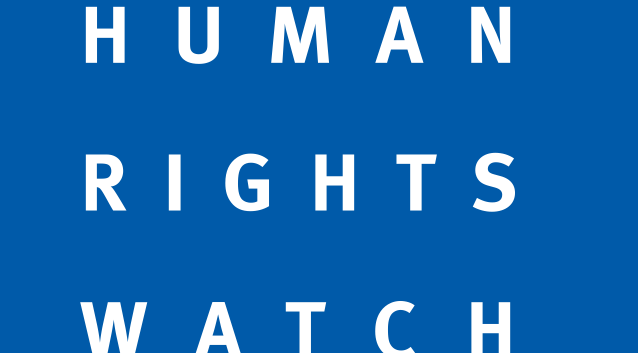Human Rights Watch Makes Up International Law for Israel — Yet Again
 by Elder of Ziyon
by Elder of Ziyon
From Bloomberg:
Loans to West Bank Settlers Violate International Law, HRW Says
Human Rights Watch called on Israeli banks to halt the financing of settlement activity in the West Bank, arguing that the legal justification they use for doing business there isn’t valid.
Israel’s five biggest banks, led by Bank Hapoalim Ltd. and Bank Leumi Le-Israel Ltd., are contributing “to serious human rights and international humanitarian law abuses” by financing construction in the settlements, the New York-based group said in a report published on Wednesday.
“Israeli banks are making existing settlements more sustainable, enabling the expansion of their built-up area and the take-over of Palestinian land, and furthering the de-facto annexation of the territory,” the report said.
The headline is slightly misleading, but HRW is still making up its own version of international law for Israel — and applying another version for the rest of the world.
Here is what HRW says about the legality of what Israeli banks do:
Israeli banks would have a responsibility in all circumstances to seek ways to honor the principles of internationally recognized human rights.
And:
Settlements are unlawful under international humanitarian law. …International humanitarian law forbids an occupying power from using land except for military purposes or for the benefit of the local population living under occupation.
If HRW was serious about Israeli banks having the “responsibility” to honor principles of internationally-recognized human rights, it would say that no company can do business in any country that engages in alleged human rights abuses.
Yet, according to HRW — and every other human rights organization — virtually every country is guilty of human rights abuses. And, of course, most of these countries have committed unspeakable crimes as compared to Israel.
Yet only Israel has such a uniquely evil system called “settlements” that even domestic companies must divest from them.
Oh, wait. Morocco builds settlements: “Hundreds of thousands of Moroccan settlers were encouraged to enter Western Sahara with state-subsidised property and employment, under the army’s protection.” Yet HRW does not say a word about international humanitarian law and Moroccan settlements. It would be laughable to see a paper by HRW demanding that Moroccan banks stop giving loans to Moroccans living on land that Morocco occupies. After all, the EU even invests in companies in Western Sahara.
Turkey builds settlements: “A group of mainland Turkish people … [have] settled in Northern Cyprus since the Turkish invasion in 1974. It is estimated that these settlers and their descendants (not including Turkish soldiers) now make up about half the population of the North.” Yet HRW does not demand any company stop investing in Turkish settlements in Northern Cyprus.
Only for Israel does Human Rights Watch keep adding restriction upon restriction — even when Israel’s settlement policy is far better grounded in international law than any of those of other countries I mentioned.
This new report from HRW doesn’t show or indicate any Israeli violation of international law, or humanitarian law, at all. But it does show yet again that Human Rights Watch does not hold any country to anything near the standards that it demands of Israel.
And that is yet more proof of HRW’s obsessive bias against Israel.
 Tehran Signals No Retaliation Against Israel After Drones Attack Iran
Tehran Signals No Retaliation Against Israel After Drones Attack Iran US Stops UN From Recognizing a Palestinian State Through Membership
US Stops UN From Recognizing a Palestinian State Through Membership Jordan Reaffirms Commitment to Peace With Israel After Iran Attack, Says Ending Treaty Would Hurt Palestinians
Jordan Reaffirms Commitment to Peace With Israel After Iran Attack, Says Ending Treaty Would Hurt Palestinians ‘Crisis at Columbia’: Elite University Spirals Into Chaos Against Backdrop of School President’s DC Testimony
‘Crisis at Columbia’: Elite University Spirals Into Chaos Against Backdrop of School President’s DC Testimony ‘A Time for Vigilance’: FBI Director Says Agency on Alert for Threats Against Jewish Community During Passover
‘A Time for Vigilance’: FBI Director Says Agency on Alert for Threats Against Jewish Community During Passover New Haggadah Released for Israeli Soldiers in Gaza Ahead of Passover
New Haggadah Released for Israeli Soldiers in Gaza Ahead of Passover ADL Data Reveals Alarming Campus Antisemitism, Despite Strong Jewish Life
ADL Data Reveals Alarming Campus Antisemitism, Despite Strong Jewish Life New Hospital Approved for Construction in Southern Israel Amid Gaza War
New Hospital Approved for Construction in Southern Israel Amid Gaza War UN Security Council to Vote Thursday on Palestinian UN Membership
UN Security Council to Vote Thursday on Palestinian UN Membership




 Gaza Terrorist Spokesperson Reveals How Media Falls for Terror Group’s Lies
Gaza Terrorist Spokesperson Reveals How Media Falls for Terror Group’s Lies Jordan Reaffirms Commitment to Peace With Israel After Iran Attack, Says Ending Treaty Would Hurt Palestinians
Jordan Reaffirms Commitment to Peace With Israel After Iran Attack, Says Ending Treaty Would Hurt Palestinians ‘Washington Post’ Platforms Superficial ‘As a Jew’ Op-Ed on Israel & Gaza
‘Washington Post’ Platforms Superficial ‘As a Jew’ Op-Ed on Israel & Gaza US Stops UN From Recognizing a Palestinian State Through Membership
US Stops UN From Recognizing a Palestinian State Through Membership Understanding the Meaning of Elijah This Passover
Understanding the Meaning of Elijah This Passover